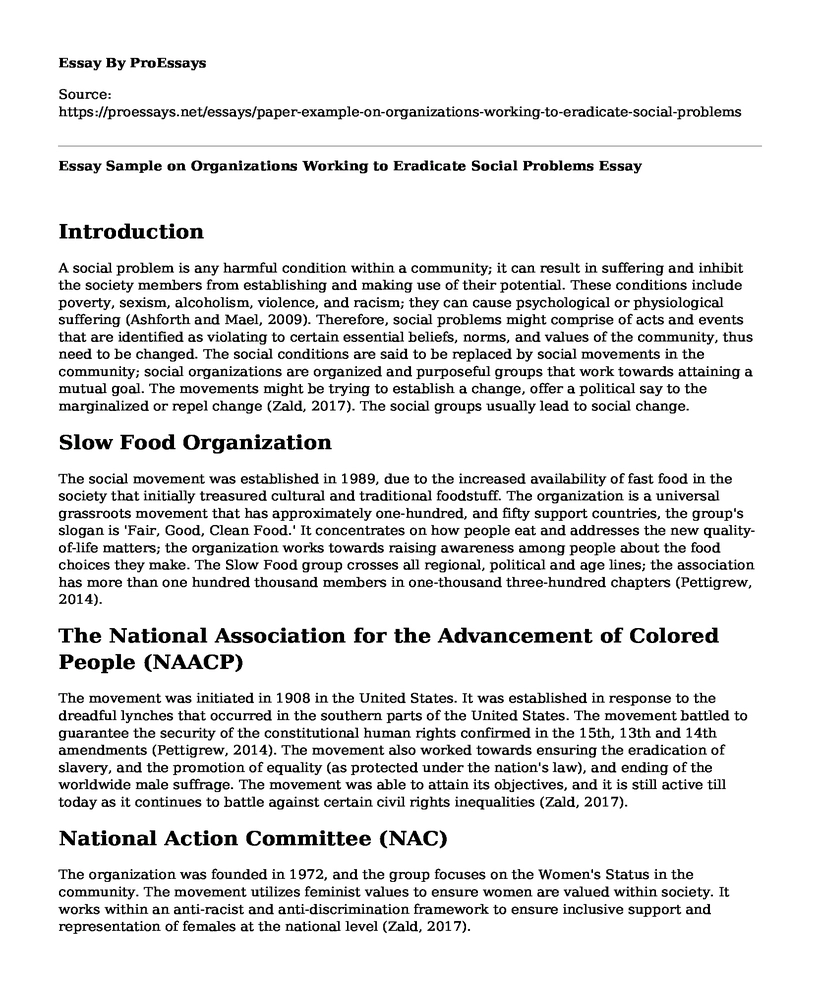Introduction
A social problem is any harmful condition within a community; it can result in suffering and inhibit the society members from establishing and making use of their potential. These conditions include poverty, sexism, alcoholism, violence, and racism; they can cause psychological or physiological suffering (Ashforth and Mael, 2009). Therefore, social problems might comprise of acts and events that are identified as violating to certain essential beliefs, norms, and values of the community, thus need to be changed. The social conditions are said to be replaced by social movements in the community; social organizations are organized and purposeful groups that work towards attaining a mutual goal. The movements might be trying to establish a change, offer a political say to the marginalized or repel change (Zald, 2017). The social groups usually lead to social change.
Slow Food Organization
The social movement was established in 1989, due to the increased availability of fast food in the society that initially treasured cultural and traditional foodstuff. The organization is a universal grassroots movement that has approximately one-hundred, and fifty support countries, the group's slogan is 'Fair, Good, Clean Food.' It concentrates on how people eat and addresses the new quality-of-life matters; the organization works towards raising awareness among people about the food choices they make. The Slow Food group crosses all regional, political and age lines; the association has more than one hundred thousand members in one-thousand three-hundred chapters (Pettigrew, 2014).
The National Association for the Advancement of Colored People (NAACP)
The movement was initiated in 1908 in the United States. It was established in response to the dreadful lynches that occurred in the southern parts of the United States. The movement battled to guarantee the security of the constitutional human rights confirmed in the 15th, 13th and 14th amendments (Pettigrew, 2014). The movement also worked towards ensuring the eradication of slavery, and the promotion of equality (as protected under the nation's law), and ending of the worldwide male suffrage. The movement was able to attain its objectives, and it is still active till today as it continues to battle against certain civil rights inequalities (Zald, 2017).
National Action Committee (NAC)
The organization was founded in 1972, and the group focuses on the Women's Status in the community. The movement utilizes feminist values to ensure women are valued within society. It works within an anti-racist and anti-discrimination framework to ensure inclusive support and representation of females at the national level (Zald, 2017).
Mothers Against Drunk Driving (MADD)
The movement was created by a mother whose child was killed as a result of drunk driving. The organization is the largest non-profit group within the US, and it works towards preventing underage driving and protection of women from drunken driving. The group also supports drugged and drunk driving survivors and victims at no price. MADD's objective is the safeguard the youths in the United States from the risks of immature drinking (Ashforth and Mael, 2009). The group has attained success in saving more than 27000 youths via the twenty-one minimum law of drinking in the year 2012. MADD also established The Power of Parents campaign that provides research-proven approaches to assist parents in keeping their siblings safe from the threats of immature drinking. The program, together with other strategic plans such as raising awareness about underage use of drugs, help decrease the percentage of young drinkers (Zald, 2017). The group also guarantees the creation of positive surroundings for the development and growth of children through the establishment and implementation of policies that deject adults from giving alcohol to youths and adolescents.
References
Ashforth, B. E., & Mael, F. (2009). Social identity theory and the organization. Academy of management review, 14(1), 20-39.
Pettigrew, A. M. (2014). The politics of organizational decision-making. Routledge.
Zald, M. N. (2017). Social movements in an organizational society: Collected Essays. Routledge.
Cite this page
Essay Sample on Organizations Working to Eradicate Social Problems. (2022, Oct 18). Retrieved from https://proessays.net/essays/paper-example-on-organizations-working-to-eradicate-social-problems
If you are the original author of this essay and no longer wish to have it published on the ProEssays website, please click below to request its removal:
- Poverty Viewed in Functionalism Essay
- Essay Sample on My Immigrant Experience
- Essay Sample on Model Minority Myth: Discriminatory & Demographically Antagonizing Concept
- Animal Testing: Pros & Cons of a Controversial Practice - Essay Sample
- Essay Example on 9/11: Flaws in Pre-Attack Response and Aftermath
- Paper Example on African Americans' Fight for Equality: A Historical Overview
- Victoria Secret Lawsuit - Report Example







